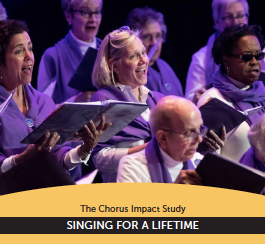Latest PPM News, Singers News
Singing for a Lifetime: The Chorus Impact Study

Chorus America has released an Arts Endowment-funded study that finds that 73 percent of choral singers said the activity “helps them feel less alone or lonely”; choral singers were also less likely than adults as a whole to report “indicators of isolation and depression.” Sixty-eight percent of choral singers reported that singing helped them to socialize better in general.
Key Findings:
1. CHORAL SINGING IS A SIGNIFICANT PART OF AMERICAN LIFE, WITH MORE THAN 54 MILLION AMERICANS SINGING TODAY.
-
- The number of Americans singing has increased over the past decade, with more than 54 million adults and children participating in choral groups today.More than one in six Americans over the age of 18 sings in a chorus.
- The percentage of Americans singing today has increased over the past decade, up to 17% today from 14% in 2008.
- Music education in schools is key to lifelong singing and the benefits it brings.The majority of adults singing today say that they began singing because of a school choral music education opportunity.Over half of all choral singers started in elementary school, and three-quarters started by the end of high school
2. ADULTS WHO SING IN CHORUSES REPORT SIGNIFICANT PERSONAL BENEFITS, INCLUDING FEELING LESS LONELY AND MORE CONNECTED TO OTHERS.
-
- Nearly three-quarters of singers (73%) say choral singing helps them feel less alone or lonely.Compared to the general public, they are far less likely to report indicators of isolation or depression.
- Choral singers report stronger relationships and better social skills than the public at large.Nearly seven in 10 singers say that singing has helped them socialize better in other parts of their lives.
- Choral singers credit singing in a chorus with making them more optimistic, mindful, and resilient.Eighty percent of singers expect more good things than bad things to happen to them, while only 55% of the general public has the same positive outlook.Singers are also more likely to feel a sense of purpose in their lives and to find their lives meaningful.
- The more exposure people have to choral singing, the more benefits they report.Choristers who belong to more ensembles, rehearse more frequently, and have been singing longer are more likely to perceive benefits.
- Younger, low- or middle-income chorus members, and those with lower levels of education, are also more likely to feel they benefit from participation.
3. CHORAL SINGERS ARE REMARKABLY STRONG CONTRIBUTORS TO THEIR COMMUNITIES.
-
- Chorus members give back to their communities in a big way.They are more likely to contribute financially to the organizations that they support than the general public.They also volunteer more frequently than the general public in a wider range of areas of need, both inside and outside of the arts—and they are more likely to take on leadership roles within the groups where they volunteer.
- Chorus members are good citizens and exhibit greater civic leadership than the general public.Ninety percent of singers report that they vote regularly in national and local elections, while only 55% of the general public makes the same claim.Choral singers also run for public office more often than their fellow Americans.
- Chorus members credit singing with helping them be better collaborators, team players, and listeners.Compared to the general public, choral singers rank themselves more reliable and are less likely to prefer electronic communication to face-to-face interaction.
- Chorus members are more adaptable and tolerant of others than the general population.Almost two-thirds of singers (63%) believe participating in a chorus has made them more open to and accepting of people who are different from them or hold different views.
4. OLDER CHORAL SINGERS REPORT BOTH A BETTER QUALITY OF LIFE AND BETTER OVERALL HEALTH THAN THE GENERAL PUBLIC.
-
- Singing in a chorus seems to have a significant impact on mental health.Older choral singers (age 65+) are less likely than the general public to say they have challenges with cognitive abilities, such as doing calculations in their heads, finding the right words to use, or organizing activities.Nearly eight in 10 older choristers credit their choral participation with helping to keep their mind sharper.
- Older singers (age 65+) engage in a broader range of activities than the general public in the same age cohort, such as reading, attending cultural events, and physical activities.They are also significantly more likely to continue working, including working by choice.
- Nearly 20% of older choristers say that choral singing has helped relieve or improve one or more chronic health conditions.Overall, singers who are age 65+ have fewer physical limitations than the general public of this same age.
- As with adult singers of all ages, older singers report that being part of a chorus helps them feel less lonely.Older choristers are significantly less likely than the general population to say they “often feel left out” or isolated from others

Comments (0)